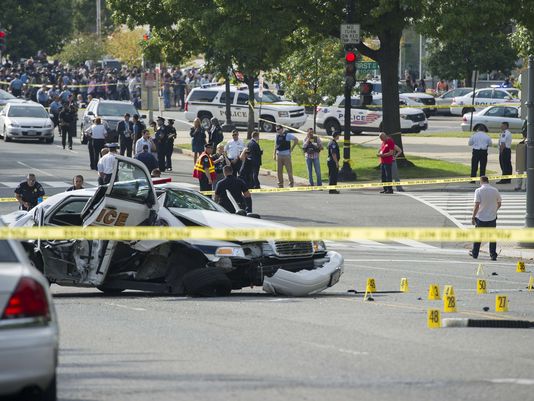
FROM MY FILES FRIDAY: I’d already decided to reprint this blog when news broke yesterday about a woman who attempted to drive into the White House grounds and then directed her speeding car toward the U.S. Capitol. Although she was unarmed, she certaintly can be seen in news footage driving dangerously. Cars can be deadly weapons and the point of this blog is not to debate whether the officers who shot her used unnecessary force. {After last month’s shootings at the Washington Naval Yard, the police have been on high alert.} But I noticed that within hours after the woman was fatally shot, stories started to circulate that she had a mental illness. At this writing, that hasn’t been confirmed, but if it is, will the public view her death differently? I think so.
FATAL SHOOTINGS AND MENTAL ILLNESS: BLAMING THE VICTIM, first published April 22, 2013.
If a schoolchild overturns a desk during an epileptic seizure and it hits a classmate and breaks that student’s foot, no one demands that the child with epilepsy be put into juvenile detention and punished. However, if that schoolchild has a mental illness and accidentally overturns a desk, injuring someone, that child is sent before a juvenile court judge for punishment because of his/her actions.
This observation came from Summit County Juvenile Court Judge Linda Tucci Teodosio who spoke last Friday during a Mental Health and Criminal Justice Symposium held in Cuyahoga Falls, Ohio. I gave the symposium’s keynote address.
Judge Teodosio’s point was that our society views mental illnesses differently from other physical illnesses and frequently holds persons with severe mental illnesses responsible for getting sick.
On the same afternoon that Judge Teodosio was speaking, police officers in Montgomery County, Maryland, responded to a nuisance call in Gaithersburg, a suburb of Washington D.C.. A 51 year old man was standing in the bed of a truck yelling profanities and hitting the vehicle with rocks. When he did not obey the officer’s commands, the police sprayed him with pepper gas and then shot him with Tasers. The man stopped breathing and was pronounced dead at a local hospital.
 In Fairfax County, Virginia, another Washington D.C. suburb, David Masters was fatally shot while sitting behind the wheel of his truck in a busy intersection in 2009. The police had been called by a business owner who complained that Masters, who had been diagnosed with a severe mental illness, had taken a potted plant without paying for it. The police officer who fatally shot Masters was fired but no criminal charges were filed against him. Masters was unarmed.
In Fairfax County, Virginia, another Washington D.C. suburb, David Masters was fatally shot while sitting behind the wheel of his truck in a busy intersection in 2009. The police had been called by a business owner who complained that Masters, who had been diagnosed with a severe mental illness, had taken a potted plant without paying for it. The police officer who fatally shot Masters was fired but no criminal charges were filed against him. Masters was unarmed.
A few weeks ago, a federal judge in New Orleans dismissed a wrongful death suit filed by the widow of Brian Harris who was fatally shot in April 2010 after police broke through his barricaded bedroom door. Harris was lying on his own bed with a knife in his hand threatening to commit suicide. When he didn’t drop the knife, he was shot with a Taser and also shot fatally by an officer with a handgun.
What disturbs me about these fatalities is how little public outcry happened after each of them. As soon as the words “mental illness” were mentioned, the public (including prosecutors and judges) seem to automatically assume that the men got what they deserved.
In two of these incidents, the men were not armed. In two of these incidents, neither man had committed a crime. Yet, all three ended up dead during encounters with the police.
Let’s go back to Judge Teodosio’s schoolchild scenario.
If these three men would have been acting oddly because they had epilepsy — would the public have reacted differently? Would people have been outraged?
I think so.
The fact that there was not much public outcry is a testament to how we blame people with mental disorders for being sick — and how we marginalize them. That’s wrong — whether it is a student accidentally knocking over a desk during a psychotic break or an adult who disobeys a police officer’s order while disoriented and pays for it with his life.



